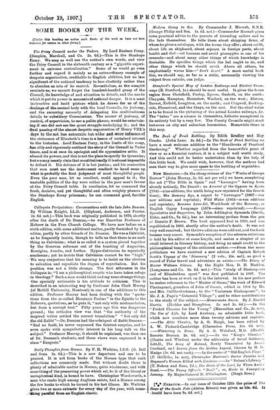Colloquia Peripatebica: Conversations with the late John Duncan. By William
Knight, LL.D. (Oliphant, Anderson, and Ferrier. 3s. f3d. net.)--This book was originally published in /870, shortly after the death of Dr. Duncan,—he was Emeritus Professor of Hebrew in the Free Church College. We have now before Us a sixth edition, with some additional matter, partly furnished by the editor, partly by other friends of Dr. Duncan. He was a Calvinist, as he frequently insists, though he tells es that there is no auch • -thing as Calvinism ; what is so called is a system pieced together by the Genevan reformer out of the teaching of Augustine, Remigius, Anselm, and Luther. Hyper-Calvinism he repeatedly condemns ; yet he insists that Calvinism, cannot• be too "high." - -We-may conjecture that his meaning is to insist on the election to salvation and repudiate the dogma of reprobation. But his position was not a little strange. The first utterance in the Colloquia is: "I am a philosophical sceptic who have taken refuge . in theology." Such a man would think and say-some strange things. One specially noticeable is his attitude to criticism. This is described in an interesting way by Professor John Clark Murray (of McGill University, Montreal) in one of the additions to this edition. Professor Murray had been, dealing with the "quota- tions from the so-called Messianic Psalms" in the Epistle to the Hebrews, quotations, an he puts it, "notonly with mistranslation, but from a corrupt text." Fifty years ago this was dangerous ground; the orthodox view was that "the authority of the inspired -writer settled the correct translation." "Not only did :the old Rabbi"—Dr. Duncan had the sobriquet of B,abbi Duncan— "find no fault, he never expressed the faintest surprise, and he even spoke with sympathetic interest in his long talk on the subject." Professor Murray, it should be explained, was then one of Dr. Dunoan's students, and these views were expressed in a class "Exegesis."










































 Previous page
Previous page